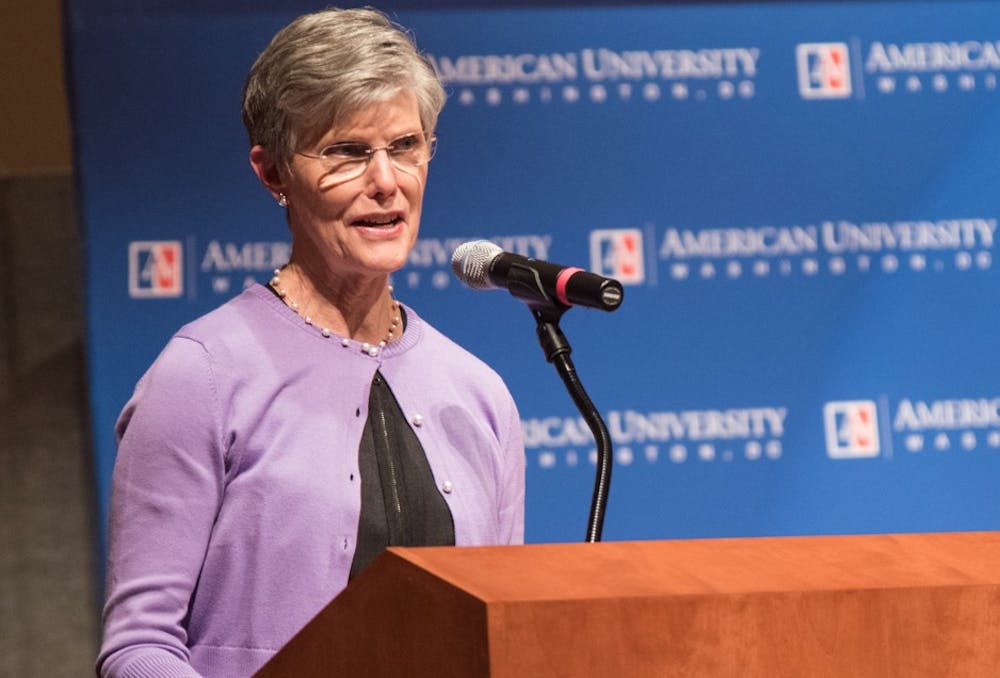This article originally appeared in The Eagle's Feb. 24, 2017 special edition.
Dr. Gail Hanson will retire from her post as Vice President of Campus Life in March, leaving behind 20 years of leadership at AU, and what her colleagues describe as a legacy of vision, dedication, composure and an uncanny sense of humor.
Hanson has witnessed cycles of changes and challenges in her time on campus, and has faced both praise and criticism — all of which “come with the territory,” she said. Her work involved supporting mental health services on campus, exploring issues of diversity and inclusion, reorganizing university departments to better serve students and championing a more proactive response to student concerns, among several other projects.
Hanson will celebrate another milestone this summer -- turning 70 years old -- and hopes to lead a more relaxed life by then. She said she hopes her retirement will bring “some degrees of freedom” back to her life.
“With great vision”
Early in her career, Hanson rose through the ranks of campus life. She worked as a Resident Assistant as an undergraduate at the University of Wisconsin-Madison, and was later a Resident Director at George Washington University. She spent 19 years working in student affairs at that school, 14 of which were spent as the Dean of Students.
When Hanson arrived at AU in 1997, she had just earned her Ph.D. in sociology from GWU and had written a dissertation on the “reinvention of organizations" while collaborating on a related project at the Department of Education.
But when she left campus life to complete her doctorate, something was missing.
“I really missed being on a college campus,” she said.
She joined what was then called the Office of Student Services, where, as the Vice President, she found herself at the helm of 18 separate units across campus. After spending a good deal of that first year listening to her colleagues’ needs and visions, she set out to reorganize the department with a new mission and purpose.
“People really needed some time to develop a sense of mission and purpose and an organizational form that they could stick with for a while and build on,” she said.
The team developed a “student-centered” mission statement, consolidated those 18 branches of the office to 13 and changed the department’s name to the Office of Campus Life by the early 2000s.
The conversion to Campus Life “recognized that some of the work that we do actually serves faculty and staff, and it certainly is responsive in some ways to students who are undergraduates, graduates and law students,” Hanson said.
“The title ‘Campus Life’ made it clear that the work had impact across the entire population, not just as a student services operation,” she said.
Housing and Dining Programs and the Center for Diversity of Inclusion, for example, are among the 13 organizations that fall under Hanson’s jurisdiction.
Dr. Fanta Aw, assistant vice president of campus life, was part of the selection committee that hired Hanson at AU and has worked with her ever since. She commended Hanson for continuously reminding the team of its mission to bring student voices to “multiple tables” while also strengthening the organizations she manages by “investing in her people.”
“She’s a consummate professional — a person with great vision and passion for student development,” Aw said. “She really understands and believes in the importance of student affairs on a university campus and brings tremendous experience and heart to her work.”
Aw also noted that the decision to reorganize the Office of Campus Life brought marked change to its functions.
“It was really a shift in paradigm about how we think about our work,” she said. “That’s an example of the kind of impact that she’s had.”
“A person, like everyone else”
Hanson’s role, in large part, is to manage the swath of organizations that fall under the Office of Campus Life. It’s a responsibility that Shyheim Snead, the student-trustee on the University board, called “a managerial feat.”
When she first started this job, Hanson said she had difficulty transitioning from previous roles where she had direct contact with students to a role as a cabinet member and manager. So, she sought out ways to stay in touch with students and built what she now fondly refers to as “The Breakfast Club.”
“I meet with them several times a semester,” she said. It’s called the Breakfast Club “because we have to get up early and have breakfast or we can’t find time to get together.”
Snead is in the club, along with Student Government President Devontae Torriente, and leaders from the Graduate Leadership Council, Residence Hall Association and the Student Bar Association.
Hosting these meetings is one of Hanson’s favorite aspects of her position.
“A highlight is working with student leaders. Always. Even when it’s hard,” she said.
Hanson’s last full semester on campus was wrought with challenges — from a federal investigation into the University’s sexual assault reporting processes in June to race-related incidents in the residence halls in September to the heartbreaking loss of a student in November and, of course, the aftermath of the presidential election.
Torriente has worked closely with Hanson for the last several months on a number of projects, including a long-term project on structural racism that will be implemented after Hanson retires. She relies on him to relay student experiences and concerns, he said, and she’s “receptive a lot of the time” to those conversations.
“To work with her this year has shown me she’s a person, like everyone else at this university, and she really puts her heart and soul into the work she does,” Torriente said.
As the University jumped hurdles time and again, Hanson served as the campus community’s first responder and was often the administrator who sent memorandums after these incidents. She was often physically present, too, when adversity struck.
When Z’ane Davis-Smith, a sophomore theater student, died following a medical emergency in McDowell Hall in November, Jonah Wolff, an RA in that building, said Hanson showed great commitment to his team in the wake of tragedy.
“We were called into an emergency meeting [that night]. The leadership of our department was there -- right up to Dr. Hanson -- in the room with us at midnight,” Wolff said. “That was incredibly meaningful to show our team that we have the full support of the University, up to somebody at the cabinet level.”
Hanson was also present when students staged a protest outside the Mary Graydon Center the day after the presidential election, during which some students burned American flags and others got into a physical altercation over their differences.
Earlier in the semester, she facilitated conversations following allegedly racially-targeted incidents against two students of color in Anderson Hall. It was Hanson, therefore, whom students saw in times of chaos, not President Neil Kerwin.
But Hanson’s efforts have not gone without criticism. Some students have argued that she does not act swiftly enough, and others say she has not been committed to resolving their problems.
Faith Ferber, a senior in the College of Arts and Sciences, called out Hanson in a 2016 Eagle article for mishandling her sexual assault case. Ferber’s assailant was found responsible of sexual misconduct, but was not punished in a way Ferber found adequate. Ferber wanted to see the man expelled, but he was instead placed on disciplinary probation and required to complete an online education module and an essay. Ferber appealed her case through Hanson and was denied.
“When my appeal got denied and I went public, that was when she really shocked me with how horrible she is,” Ferber said.
Ferber also said Hanson does not aptly respond to either sexual assault or race-related incidents on campus.
“Gail Hanson just doesn’t care about students,” she said. “She cares about the brand, about the reputation of the school.”
Those in Hanson’s closest circles see her responses to these issues differently. She works hard to gather all the facts and is “extremely measured in the decisions she makes,” Aw said.
Torriente and Snead echoed her sentiment, and both said changes in University policy often take longer than some students would like.
“Her legacy will be one of trailblazing really difficult leadership during really controversial, contentious times on our campus for 20 years,” Snead said.
Attempting to please the entire campus is a perennial challenge that is always prone to failure, Hanson said.
“Campus life is always challenging,” she said. “There are always tough years, there are always tough issues, there are always people who think you can do more and do better. And our challenge is always to listen, to make of that what we can, and to turn it into progress one way or another.”
“This is a place you can really love”
As Hanson heads into retirement, she said she is looking forward to having time to breathe and getting some space from her demanding role.
“I have loved my work for all the time I have done it,” she said. “I think one of the great gifts in a life is to find something you think matters and get a chance to do it, and do it reasonably well, for a very long period of time.”
She’s not sure what she’ll do next, but knows it will involve activism of some sort.
“As our national situation evolves, I can see a whole lot that I want to be throwing myself into,” she said. “As long as I’ve got some energy, I’m going to try to do something that matters.”
Of all that Aw has learned from Hanson in their two decades of working together, she said she will most remember the attitude Hanson brought to their critical roles.
“She has an incredible sense of humor and [she’s] also someone who has tremendous compassion for people,” Aw said. “I think for the nature of the work that we do, having a sense of humor is important. It reminds me that the nature of our work is really important, but we should not take ourselves so seriously.”
Aw said she will miss Hanson’s “calm demeanor” in challenging times and hopes her successor will “take stock of what has really worked well in this organization” and to build onward from there.
Hanson also offered a piece of advice to the school’s next Vice President of Campus Life.
“This is a place you can really love. And do love it. Because if you love it, you will do good work,” she said. “You love it, you listen, you get up everyday and go hard. You do all that, you’ll be fine.”
Deanna Mudry contributed to this report.





